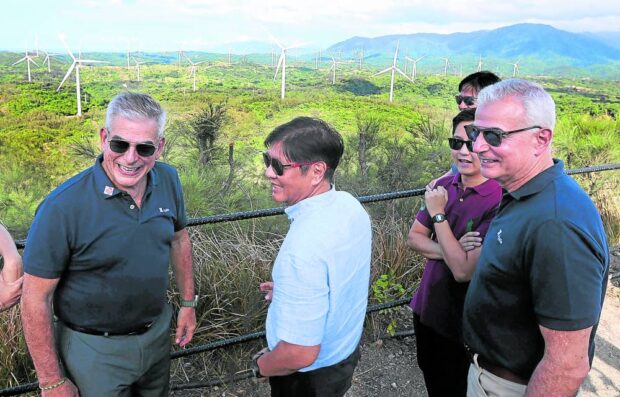
HARNESSING ILOCANDIA AIR President Marcos views the newly constructed wind farm in Pagudpud, Ilocos Norte, together with his son, Ilocos Norte Rep. Sandro Marcos, Ayala Corp. chair Jaime Augusto Zobel de Ayala (left) and Ayala Land adviser Fernando Zobel de Ayala. Mr. Marcos led the inauguration of the Ayala project in his home province on Friday. —MARIANNE BERMUDEZ
PAGUDPUD, Ilocos Norte— President Marcos inaugurated on Friday a 160-megawatt wind farm which will be the biggest in the country once completed.
Joining Marcos in the inauguration were his eldest son, Ilocos Norte Rep. Ferdinand Alexander “Sandro” Marcos, Energy Secretary Raphael Lotilla and Ayala Corp. chair Jaime Augusto Zobel de Ayala, who also spoke at the inauguration.
The P11.8-billion Pagudpud Wind Farm, spanning an area across the coastal village of Balaoi and neighboring Caunayan village, is a project of ACEN Corp., the listed energy platform of the Ayala group.
In his speech, the President emphasized the need to tap alternative renewable and clean energy.
“I am here today because it is important to highlight the importance of our shift from fossil fuels to renewables. And this is a very, very important and very, very large part of that shift that we are trying to implement in our energy mix,” Marcos said.
“We need to continue building facilities like this because what is needed in the market today is clean energy,” he added.
“It is a very proud day for me to see that what we had started has continued and it looks like it will further continue. After this, I hope that we will be coming back fairly soon to inaugurate the 100th turbine,” the President also said.
Boost capacity
Zobel de Ayala, in his speech, said the wind farm is already operating at 50-percent capacity, or 80 MW.
The project must have a capacity of 160 MW by the end of 2025, in compliance with the Department of Energy’s Green Energy Auction Program.
So far, 19 companies, including ACEN Corp., have been awarded supply contracts through that competitive-bidding program for renewable energy enterprises.
Zobel de Ayala said the company further aims to boost the capacity of Pagudpud Wind Farm.
“Once complete, ACEN will have a total of 360 MW of wind capacity across 99 wind turbine generators in Ilocos Norte,” he said.
He said the project has so far provided more than 1,200 jobs to the local community since construction began in 2021.
John Eric Francia, president of the company, said it was targeting to increase, by the end of the year, the wind farm’s capacity to 135 MW.
Pagudpud Wind Farm could help provide power to 123,875 homes and avoid approximately 344,600 kilotons of carbon emission annually, the company said in a statement.
Electricity costs
The facility is the third such project in Ilocos Norte, after NorthWind Bangui Bay in Bangui town which began operations in 2005 and North Luzon Renewables, also in Pagudpud, which started operating in 2014.
With the government aiming to expand the use of renewable energy in the country, Marcos in April issued an executive order (EO) to expedite the issuance of permits for offshore wind (OSW) power projects.
In Executive Order No. 21, he cited Republic Act No. 9513 or the Renewable Energy Act of 2008, which mandates the government to accelerate the exploration and development of renewable energy resources such as wind, solar, hydroelectric, geothermal and sea energy.
“OSW, if optimally developed, will play a major role in our country’s goal for a low-carbon future, improved energy security, and reduced dependence on import fuels,” the EO read.
Mr. Marcos said wind power and other renewable energy sources would help bring down electricity costs in the country, as he cited 2019 data showing that the Philippines had the third most expensive power rates in the region, after Japan and Singapore.
By
and